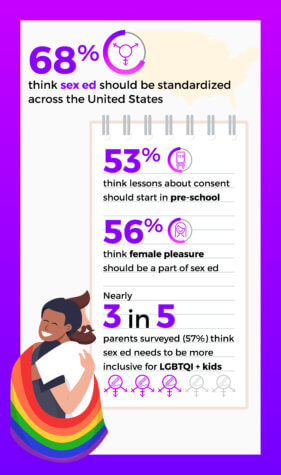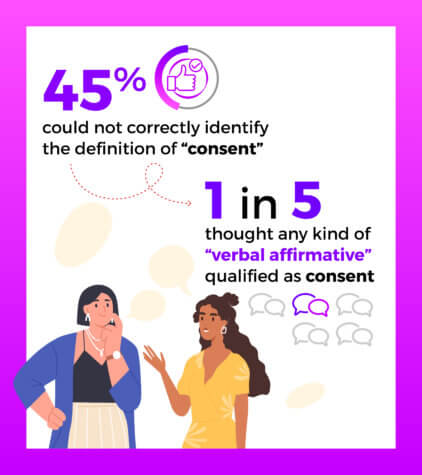
(© Сергей Храмов - stock.adobe.com)
NEW YORK — Do Americans know enough about sex and when is it too early to start learning? An alarming number of Americans could not correctly identify the definition of consent in a new study. In fact, the survey of 2,000 people reveals only 55 percent can identify consent as a “clearly communicated, verbal, and affirmative agreement between participants to engage in sexual activity.”
One in five respondents (21%) thought consent was just any kind of “verbal affirmative” while 13 percent consider any sort of physical indicator from a partner that they want to have sex as consent. Among respondents who are sexually active (61%), two in five say they don’t receive verbal consent from a partner every time they have sex.
The survey, conducted by OnePoll on behalf of HUD App, reveals many are aware of the knowledge gap in their own sexual education and its potential consequences.
Half the poll (51%) said they thought their first sexual experience would have been better if they had gotten a better sexual education. Nearly seven in ten (68%) said sex education classes should be standardized across the country so all students are learning the same concepts.
It's time for sex ed reform
Sixty-five percent revealed they think sex ed in the United States is sorely lacking, with the majority thinking it needs to start way earlier than middle school. Many respondents believe it’s high time for the concept of consent to enter school lesson plans at early ages. In fact, 53 percent go so far as to say education on consent should begin in pre-schools. These respondents add they believe children need to learn at an early age to respect others’ personal boundaries and bodily autonomy.
That’s not the only structural change to sexual education respondents want to see. Two in three want to see more emphasis in sex ed classes on birth control since 59 percent think it’s “unrealistic” to solely teach abstinence.
Three in four respondents would like to see honest communication techniques taught in class so partners can have open conversations about their preferences and experiences. Beyond talking about sex, 56 percent think discussions about female pleasure should be a part of sex education.
The knowledge gap on sex ed doesn’t end in schools though, with parents feeling left in the dark too. Forty-four percent of parents confess they felt ill-equipped to talk to their children about sex due to a lack of resources.
Nearly three in five parents (57%) think schools should expand their sex ed curriculum to be more inclusive for LGBTQI+ children too.

Many respondents say they’re open to becoming more informed about sex. In fact, 38 percent are willing to take a sex education class now to gain more knowledge on the topic. Knowledge is power in the world of romance, as 40 percent think their dating lives would improve if they knew more about sex ed. The most common topics respondents want a refresher course on include partner communication skills (32%), birth control options (32%), and female pleasure (30%).
“Sex education equips people with the knowledge and skills to make responsible, respectful decisions about their sexuality. Sex education is empowering, and we need to close the gap for young people who aren’t getting the information they need to be safe and confident,” Wilson adds.












Quoting a study without linking to the study is trash journalism.
Agreed!
The population of a study should be upwards of 5000 participants. This study doesn't have near enough.